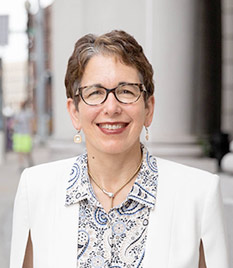Watching the Academy Awards last night, I was struck by the diversity of voices represented by the nominees and their work. Each one tells a unique story.
Ruth E. Carter made history when she became the first black woman to win a Best Costume Design Oscar for her work in Black Panther. In her acceptance speech she said: “My career is built with passion to tell stories that allow us to know ourselves better.”
I’m so excited that Carter will soon become part of the Suffolk story when we welcome her as our College of Arts & Sciences commencement speaker this spring.
Carter’s groundbreaking work spans decades and genres. Her meticulously researched and exquisitely designed costumes help transport audiences, bringing history to life and making fantasy real. Carter’s work also has a cultural impact beyond the world of film, with her African influenced Black Panther designs inspiring fashion from the runway to the tennis courts of Serena Williams. The enormous success of Black Panther is due in no small part to Carter’s talents, and speaks to the global appetite for stories that amplify long-marginalized voices.
Like many of you, I also watched with pride as Suffolk alumna Gabriela Rodriguez was nominated for her work as a producer on Roma, a drama focused on the housekeeper of a 1970s family in Mexico City. Rodriguez, BS ’03, was the first Latin American woman to contend in the Academy Awards Best Picture category. Her nomination, and the film’s impressive Oscar tally, contribute to the growing awareness that well-told stories of traditionally underrepresented people can garner both artistic and commercial success.
It is about time we tell those stories and honor those experiences. I hope that sentiment was shared by millions of viewers last night, as I am certain it is shared by so many of us here in the Suffolk community.
Back in 2016, you will recall, the #OscarsSoWhite social media movement shined a light on what many viewed as the systemic omission of people of color from the Awards’ nomination and voting processes. Last night was a significant step forward, though of course with much work still to be done.
I am proud Ruth E. Carter will be one of our distinguished commencement speakers this year, and so pleased that we could announce this during this important month. Each day these last few weeks when I passed by the Sawyer Library’s Black History Month display I was reminded of the unique opportunity we have as an academic community to learn from those whose lived experiences might be very different from our own. The exhibit features highlights from decades of Ford Hall Forum events that have brought, and continue to bring, thought-provoking topics and iconic figures including the Rev. Martin Luther King, Jr., and Maya Angelou into our orbit. It also showcases individual Suffolk stories, like that of Thomas Vreeland Jones, a World War I veteran who was among the first African Americans to graduate from Suffolk Law School over a century ago and in whose name a scholarship continues to provide assistance to law students. And some day in the future, perhaps it will also include a reference to Ruth E. Carter’s undoubtedly inspiring commencement speech.
Suffolk will wrap up this Black History Month on Thursday with a talk and demonstration from Gwendolyn Rosemond — organized by the Black Faculty & Staff employee resource group — who will share the origins and art of African storytelling. I can think of no better way to celebrate and learn than by sharing in this rich cultural tradition.
As Black History Month draws to a close, I hope we will reflect on the steps towards inclusion reflected in this year’s Oscars, while recognizing there is more to be done. And I hope we will be reminded that this is true at Suffolk as well – there are steps that we must take as a community on an ongoing basis, and long after the month of February has drawn to a close.

Marisa J. Kelly
President





Leave A Comment
I welcome two-way communication with the Suffolk Community. Faculty, staff, and students are encouraged to respond to posts, exchange ideas, share opinions, and offer feedback by logging in below using your regular Suffolk login (without "@suffolk.edu"). Comments should be made in accordance with standards of civil discourse, and we reserve the right to delete derogatory or inappropriate comments. log in